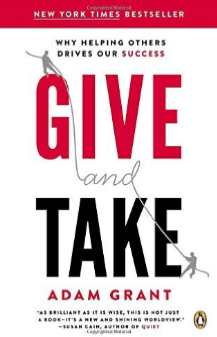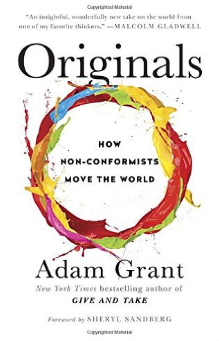 I recently read “Give and Take: A Revolutionary Approach To Success” by Adam Grant. Below are the quotes I found most interesting. If you like the quotes, buy the book here.
I recently read “Give and Take: A Revolutionary Approach To Success” by Adam Grant. Below are the quotes I found most interesting. If you like the quotes, buy the book here.
“If you insist on quid pro quo every time you help others, you will have a much narrower network.” (45)
“Rifkin is governed by a simple rule: the five-minute favor. “You should be willing to do something that will take you five minutes or less for anybody.” (55)
“Overall, the surgeons didn’t get better with practice. They only got better at the specific hospital where they practiced.” (70)
“A defining feature of how givers collaborate: they take on the tasks that are in the group’s best interest, not necessarily their own personal interests.” (74)
“Eugene Kim and Theresa Glomb found that highly talented people tend to make others jealous, placing themselves at risk of being disliked, resented, ostracized, and undermined. But if these talents people are also givers, they no longer have a target on their backs. Instead, givers are appreciated for their contributions to the group.” (75)
“Carolyn Omine adds, ‘Compared to other writers’ room I’ve been in, I would say The Simpsons tends to look longer for jokes. I think it’s because we have writers, like George, who will say, ‘No, that’s not quite right,’ even if it’s late, even if we’re all tired. I think that’s an important quality. We need those people, like George, who aren’t afraid to say, “no, this isn’t good enough. We can do better.’” (76)
“‘One of the best things about developing that credibility was if I wanted to try something that was fairly strange, people would be willing to at least give it a shot at the table read,’ Meyer reflects. ‘They ended up not rewriting my stuff as much as they had early on, because they know I had a decent track record. I think people saw that my heart was in the right place – my intentions were good. That goes a long way.’” (76)
“This is a perspective gap: when we’re not experiencing a psychologically or physically intense state, we dramatically underestimate how much it will affect us.” (87)
“The same patterns emerged with friends giving and receiving wedding gifts and birthday gifts. The senders preferred to give unique gifts, but the recipients actually preferred the gifts they solicited on their registries and wish lists.” (89)
“‘There are only a few hundred people at any one time writing television comedy for a living,’ Meyer says. ‘It’s a good idea not to alienate these guys, and most of the jobs you get are more or less through word of mouth, or a recommendation. It’s really important to have a good reputation. I quickly learned to see other comedy writers as allies.’” (91)
“Success doesn’t measure a human being, effort does.” (102)
“Of course, natural talent also matters, but once you have a pool of candidates above the threshold of necessary potential, grit is a major factor that predicts how close they get to achieving their potential.” (106)
“When Dave stammered and tripped over a couple of arguments, something strange happened. The jurors liked him.” (129)
“Research suggests that there are two fundamental paths to influence: dominance and prestige.” (130)
“But there’s a twist: expressing vulnerability is only effective if the audience receives other signals establishing the speaker’s competence.” (133)
“Psychologists call this the pratfall effect. Spilling a cup of coffee hurt the image of the average candidate: it was just another reason for the audience to dislike him. But the same blunder helped the expert appear human and approachable – instead of superior and distant.” (134)
“By asking people questions about their plans and intentions, we increase the likelihood that they actually act on these plans and intentions.” (142)
“New research shows that advice seeking is a surprisingly effective strategy for exercising influence when we lack authority.” (150)
“Seeking advice is among the most effective ways to influence peers, superiors, and subordinates.” (150)
“Research shows that people who regularly seek advice and help from knowledgeable colleagues are actually rated more favorably by supervisors than those who never seek advice and help.” (151)
“When we ask for advice, in order to give us a recommendation, advisers have to look at the problem or dilemma from our point of view.” (151)
“Benjamin Franklin ‘had a fundamental rule for winning friends,’ Isaacson writers: appeal to ‘their pride and vanity by constantly seeking their opinion and advice, and they will admire you for your judgment and wisdom.’” (153)
“The change of context brought renewed energy.” (169)
“Research shows that if people start volunteering two hours a week, their happiness, satisfaction, and self-esteem go up a year later.” (174)
“Giving has an energizing effect only if it’s an enjoyable, meaningful choice rather than undertake out of duty and obligation.” (175)
“Three decades of research show that receiving support from colleagues is a robust antidote to burnout.” (177)
“If you spend the money on yourself, your happiness doesn’t change. But if you spend the money on others, you actually report becoming significantly happier.” (183)
“It’s wise to start out as a giver, since research shows that trust is hard to build but easy to destroy. But once a counterpart is clearly acting like a taker, it makes sense for givers to flex their reciprocity styles and shift to a matching strategy.” (198)
“Givers, particularly agreeable ones, often overestimate the degree to which assertiveness might be off-putting to others.” (208)
“When we look at a rivas as a fellow soccer fan, rather than as an enemy, we can identify with him. Oftentimes, we fail to identify with people because we’re thinking about ourselves – or them – in terms that are too specific and narrow. If we look more broadly at commonalities between us, it becomes much easier to see giving as otherish.” (226)
“Psychologists have found that on average, people whose names start with A and B get better grades and are accepted to higher-ranked law schools than people whose names start with C and D – and that professional baseball players whose names start with K, the symbol for strikeouts, strikeout 9 percent more often than their peers.” (231)
“It was not just any commonality that drove people to act like givers. IT was an uncommon commonality.” (232)
“A popular way to achieve optimal distinctiveness is to join a unique group. Being part of a group with shared interests, identities, goals, values, skills, characteristics, or experiences gives us a sense of connection and belonging. At the same time, being part of a group that is clearly distinct from other groups gives us a sense of uniqueness. Studies show that people identify more strongly with individuals and groups that share unique similarities. The more rare a group, value, interest, skill, or experience is, the more likely it is to facilitate a bond. And research indicates that people are happier in groups that provide optimal distinctiveness, giving a sense of both inclusion and uniqueness. These are the groups in which we take the most pride, and feel the most cohesive and valued.” (233)
Liked the quotes? Click here to buy the book


